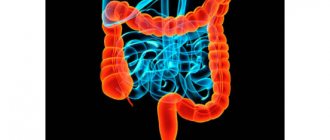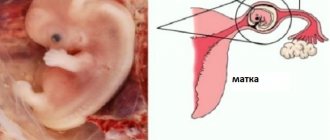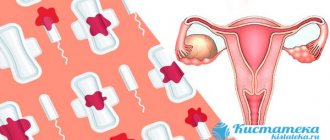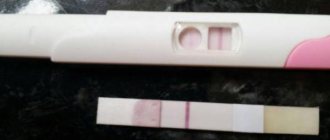The very first signs - can you feel them?
The modern world offers a large number of means of determining pregnancy in the earliest stages. Most often they are reliable in the first weeks after a missed period. Emotional by nature, women can feel the slightest changes in their body and even before the end of the menstrual cycle, suspect signs of the birth of a small life.
They are unlikely to name the exact date of conception, and the beginning of each cycle is marked on the calendar. Obstetricians will use this day as a basis for calculating the duration of pregnancy and the upcoming birth. Women planning motherhood are more likely to determine their due date if they tracked ovulation, which often occurs in the middle of the cycle.
The frequency of the cycle is different for everyone, most often it is a 4-week period, but it can be shorter or longer. As soon as the fertilization of the egg has occurred, metamorphosis occurs in the woman’s body. For some, they do not immediately become noticeable, while others feel the slightest nuances of physiological transformation already on the 16th - 18th day of the cycle.
The first ones are the most responsible and wonderful transformations
The zygote is a one-celled embryo that travels through the fallopian tube for about 6 days. His goal is a warm and nourishing womb. At the same time, the ovary produces the corpus luteum, which is responsible for the production of the necessary hormones that will support the onset of pregnancy.
Introduction into the uterine wall takes place on the 7th day (22 - 23 days from the beginning of the cycle). Light bleeding during these 2 days is possible, but not necessary.
On the 24th - 25th day of the cycle or on the 9th day after the birth of a new life, the fertilized egg is formed, its place is carefully guarded, and its outer layer gives signals about the onset of pregnancy with the help of the hCG hormone.
The new hormone in the body works like a skillful and experienced leader. All systems work hard:
- heart;
- lungs;
- kidneys;
- endocrine glands.
This mechanism starts a miracle machine; it is no coincidence that women even before the delay assume a possible pregnancy.
What signs may indicate conception has taken place?
The onset of pregnancy is not asymptomatic, the first signs are considered insignificant, attentive women will feel them:
- Bloody discharge on days 6-12 from the beginning of ovulation, if the couple had unprotected intercourse (similar to the beginning of menstruation, but the color is yellowish-brownish;
- An elevated basalt temperature of up to 37⁰ or slightly higher lasts for a long time and does not change at the time of the delay of a new cycle - indicates a hormonal factor, when progesterone works to provide for the fetus and create better conditions for it;
- A sharp drop in t⁰, and then a restoration of increased basaltic temperature. Symptoms of chills appear, the face turns red, but a feeling of heat may suddenly set in and it becomes stuffy. Changes in heat and cold are the first signs of pregnancy on days 20–21;
- The breast condition, usually painful before menstruation, may remain unchanged. In rare cases, on the contrary, the skin around the nipples swells;
- A woman may notice a feeling of fullness in the lower abdomen due to the large flow of blood to the walls of the uterus on days 21–28 of the cycle.
- A change in libido from days 22 to 26 indicates hormonal changes; desires may not arise at all or flare up with strong cravings.
- Lack of sleep, agitation, weak superficial sleep, early awakening may indicate conception on the 18th -22nd day - this is relevant.
- Lack of attention during the daytime, drowsiness and depressed psyche will support the version of pregnancy already on the 22nd - 25th day.
- A change in the sense of smell and taste of familiar foods, even before the delay occurs, will confirm a possible conception.
- The surest sign may be early toxicosis; on the 11th - 14th day after conception, the expectant mother may experience nausea. On the 22nd there is often vomiting in the morning.
Dependence of pregnancy signs on fetal development
The most basic changes in fetal development begin on days 21–22 of the cycle, and the first signs of pregnancy most clearly appear from this time.
The formation of the embryo's nervous system affects the change in the functioning of the expectant mother's taste buds.
The spinal cord, brain and heart muscle, developing in the womb, bring headaches to the woman, the sense of smell becomes acute, and the woman begins to be irritated by pleasant odors.
The level of hormonal changes on days 22 - 23 increases salivation, a state of mild nausea in the morning is the first sign of successful conception. After this period, the pregnancy test for some girls may slightly color the second strip.
From about 27 - 28 days the signs become increasingly brighter. Certain eating habits appear, the woman is disoriented, she is confused by smells or attracted to them, even by those that she had not noticed in the recent past. She often refuses to eat her usual food. Spicy and salty foods are attractive.
This is how the body reacts to a lack of vitamins, microelements, and minerals necessary for the development of the fetus. A planned pregnancy should focus on consuming only high-quality and healthy products from the first days.
If your period is late, you need to check your assumptions about a successful conception using a test. After 2 days, repeat testing is simply necessary if the first attempt did not give a solid result.
Primary signs and a positive test are an almost 100% guarantee of motherhood. A visit to the doctor will be necessary, and the sooner, the calmer the mother will be about the future life of the little man.
Source: YaGotova.ru
When do the first signs of pregnancy appear after conception?
A woman's egg is capable of fertilization in the first 12 hours after ovulation. If a woman tracks her cycle and knows exactly when the egg was released, she can determine whether conception occurred after the act or not.
Symptoms of pregnancy in the first days after conception are similar to those of PMS of varying severity. The fact is that during the luteal period, a woman’s body always prepares for pregnancy - just in case. And the processes that take place in it after the release of the egg are always the same for about two weeks, regardless of whether conception has occurred or not.
The corpus luteum, which remains in the ovary after ovulation, produces the hormone progesterone, so women’s breasts swell and become sensitive, irritability, drowsiness, fatigue appear, they want to go to the toilet more often, and so on. If pregnancy has actually occurred, then the symptoms continue, intensify and become more characteristic, and if not, menstruation occurs.
Therefore, before the onset of menstruation, many women notice certain symptoms, which are often considered signs of conception. Their presence, severity and strength depend on the characteristics of the organism. They are not at all mandatory - neither in the case of pregnancy, nor in the absence of it.
Many symptoms may not even be caused by PMS, but by ordinary illness or stress. Therefore, you should not rely 100% on such signs of conception. But knowing them is useful - at least for your own peace of mind.
If a woman usually goes through the second phase of her cycle without pronounced symptoms, the presence of such signs can serve as a kind of “beacon” and allow us to suspect an interesting situation.
As a rule, at 1 week the pregnancy is not even considered pregnancy. At this time, the fertilized egg moves through the tubes into the uterus, where it will take hold and spend the next 9 months. There are no obvious signs these days, although discharge uncharacteristic of the phase of the cycle, pulling sensations in the abdomen, drowsiness, headache and irritability may appear. But for many women, it is precisely these symptoms that accompany the entire second phase - they form the notorious PMS.
Usually the first signs appear approximately 8-10 days after conception. This largely depends on the characteristics of the body of each individual woman, on her attentiveness and level of sensitivity. It is at week 2 that some expectant mothers experience the phenomenon of implantation bleeding.
After fertilization of the egg has occurred, it moves to the uterus and becomes attached to one of its walls. In this case, micro-ruptures of blood vessels and capillaries may occur, which are accompanied by bleeding. This phenomenon occurs in only 20-30% of all pregnancies, and sometimes it is mistaken for menstruation that began prematurely.
However, it is not difficult to distinguish bleeding during embryo implantation from normal menstruation. It lasts only a few hours, less often it lasts the whole day. At the same time, its intensity is weak and does not increase. The color of the discharge is light brown, bright red or pink. An analysis of hCG levels at this time is not yet informative, since the changes are just beginning.
Signs of pregnancy at 3 weeks are already more distinct. The sensations in the chest intensify - soreness, sensitivity, tingling, the areolas around the nipples darken. Taste preferences and reactions to smells change, chronic diseases worsen. As a rule, at this time a delay in menstruation is already detected, so it’s time to do a test or donate blood for hCG.
When do symptoms appear?
Oddly enough, the first week of pregnancy is determined by the date of the last menstruation.
Your last period counts as the first week of pregnancy, even if you weren't actually pregnant yet. The approximate date of birth is calculated from the first day of the last menstruation.
Taking a home pregnancy test is the most affordable and easiest way to find out if you are pregnant. Remember that home pregnancy tests measure the level of a hormone called human chorionic gonadotropin (hCG) in the urine, and there is usually less of it in the urine than in the blood.
The test gives the most accurate results starting from the moment of missed menstruation.
A menstrual cycle is considered delayed if your period does not start 5 or more days after the day it was expected to start.
However, it is worth remembering that even the day after the expected delay, more than a third of women give a negative result from such home tests, and if you take the test too early, the result may be negative, even if you are already pregnant. You can do another test at home after a couple of days to get a more accurate result.
How to recognize pregnancy in the early stages
Accurately recognizing pregnancy before delay is an unrealistic task. After all, the main reliable sign is the absence of bleeding on day X. However, there are certain symptoms that tell a woman that something is wrong with her. However, as mentioned above, you cannot completely rely on it.
Increased BT
Those women who regularly measure their basal temperature know that after ovulation it always rises sharply by a few tenths of a degree. This usually lasts about two weeks and before menstruation the temperature returns to normal. If pregnancy occurs, the temperature above 37 will remain for about two more months.
It is believed that a sign of conception after ovulation is an increase in BT to 37-37.5 degrees at the very end. This is noted by many mothers, although there is no exact confirmation of this phenomenon. At 1 week of pregnancy, this is facilitated by the high level of progesterone produced by the corpus luteum.
Read a detailed article about basal temperature in pregnant women.
Insomnia and nervousness
With hormonal imbalance caused by changes in the female body, many systems and organs work in a new way. This greatly affects the emotional background of a woman. Therefore, the first symptoms of pregnancy can also manifest themselves in the form of irritability and nervousness, which lead to insomnia.
Drowsiness, fatigue, low blood pressure
Sometimes in the first days of pregnancy a feeling of drowsiness appears; a woman gets tired faster and feels tired even after a long rest. My head starts to feel dizzy due to low blood pressure. These signs of pregnancy are also subjective and unreliable; they can occur due to ordinary overwork.
Discomfort in the abdomen and lower back
Secondary symptoms of pregnancy also include strange sensations in the abdomen or lumbar region. At the beginning of pregnancy, the blood supply to the pelvic organs increases, so women often feel heaviness and compression, discomfort in a sitting position.
You may feel a nagging pain in the lower back, although this is often a sign of kidney problems. But increasing pain in the lower abdomen can warn of an ectopic or a threatened miscarriage. Changes in the uterus sometimes cause a tingling feeling, although not all girls feel it. Another sign of pregnancy in the second week, and even later, is bloating. Hormonal changes lead to relaxation of the intestinal muscles and flatulence.
Read a detailed article about abdominal pain after conception.
Headache
The first signs of pregnancy before menstruation include spontaneous headaches. They are caused by hormonal fluctuations. At the same time, there are no external reasons for the migraine - the girl did not catch a cold, got enough sleep, and did not sit in a stuffy room.
"Gorges" or lack of appetite
After conception, metabolism speeds up, so signs of pregnancy also include an increase in appetite.
The exact opposite picture can also be observed - a woman cannot swallow a spoon. As a rule, this is associated with changes in the perception of taste and aromas of food.
Intolerance to certain odors
During pregnancy, many women become very sensitive to smells and tastes. This applies not only to food, but also to everything that surrounds a woman - cleaning products, cosmetics, perfume, flowers. The girl clearly senses smells and tastes that she had not paid attention to before. Or she suddenly “fell out of love” with the ones she used to like.
Digestive disorder
Hormonal changes are often accompanied by changes in the functioning of the gastrointestinal tract. Girls may suffer from constipation or diarrhea, belching, and heartburn. Nausea and vomiting, which are the first signs of pregnancy, rarely occur before a missed period. As a rule, toxicosis begins at about 4 weeks.
Fever, cold
To prevent the body from rejecting the embryo, which is a foreign body to it, after conception the woman’s immunity decreases. That is why one of the common symptoms of pregnancy is a cold (ARVI).
However, an increase in body temperature to 37 degrees is, in principle, typical for the first months of pregnancy, and due to hormonal imbalance, a woman sometimes feels hot or cold.
Read whether temperature can be a sign of fertilization.
Acne
After a woman becomes pregnant, her body begins large-scale hormonal changes, so many people notice the appearance of skin rashes - pimples, blackheads - among the early symptoms of pregnancy. It is especially worth paying attention to this for those who have not previously been bothered by such symptoms. It should be remembered that acne often accompanies the second phase of the cycle, so the symptom is subjective and unreliable.
Age spots on the face and darkening of the nipples
Many people consider the appearance of various pigment spots on the face or darkening of the breast areolas as a sign of fertilization of the egg. These signs are also subjective and cannot serve as a reliable guide. For some women, the areolas become very dark already in the first month of pregnancy, while others do not notice this until the very end. Every woman’s body is unique, so the birth of a new life always goes a little differently than others.
Frequent urination
Pregnancy before the delay can also be determined by the frequency of trips to the toilet. Frequent urges are associated both with increased blood flow to the female organs and with a hormonal storm. Or they can be explained by aggravated inflammatory processes, for example, cystitis.
Read the article about cystitis after conception.
Early signs
https://www.youtube.com/watch?time_continue=195&v=asxWSdI-uL4
When analyzing the state of your body, you must first of all use common sense and not mistake a common cold or food poisoning for pregnancy. The body begins to actively change its usual functions from the very first seconds of conception and it is considered absolutely normal that signs of pregnancy can begin to appear a week before menstruation.
Most of the symptoms of an “interesting situation” continue throughout the entire period of gestation, so the signs of pregnancy after menstruation (presumable) are practically no different from the sensations that appeared 7–10 days before the delay.
Implantation bleeding
After fertilization has occurred, the egg begins to look for a suitable place in the uterine cavity for implantation into its wall. This happens 6–12 days after conception. The process of implantation of the fertilized egg is often accompanied by pain in the lower abdomen and specific vaginal discharge.
It is this sign of pregnancy before menstruation that is the earliest and its appearance confuses many women.
They are confused by the duration, consistency and nature of the discharge. When implanted, they are usually scanty and limited to a few drops of pink or yellow-brownish blood. Some women do not have this sign, which is also considered normal. If such bleeding appears after a delay, this should alert you, as there may be a threat of miscarriage.
Breast changes
Breast swelling is a well-known symptom and is characteristic of both the menstrual period and pregnancy. Therefore, it is very difficult to recognize conception only by swelling, sensitivity or soreness of the mammary glands.
In parallel with these signs, the condition of the nipple area also changes externally. The aureole around them becomes darker or enlarges (as if it swells), and white discharge of a milk-like fluid may appear from the ducts when pressed. The breasts are thus prepared for feeding the baby. Changes in the mammary glands are usually characteristic of 1–2 weeks of pregnancy.
Frequent urination
An increased number of trips to the toilet during the day and especially at night is a clear sign of pregnancy after and before a delay. It is associated with the restructuring of hormonal balance in the body. An increase in the level of female hormones stimulates an increase in blood flow to the organs of the genitourinary system. Blood-filled blood vessels restructure the functioning of the bladder, kidneys and ureters. In addition, due to the intense rush of blood, the uterus increases in volume and puts pressure on the bladder.
It is important to remember that the process of urination due to pregnancy should not be accompanied by burning, painful and cutting sensations.
Increase in basal temperature
Women who are planning a pregnancy try to monitor changes in basal (rectal) temperature, because it can be used to determine whether conception has occurred successfully. BT during pregnancy is consistently above 37 °C and lies in the range of 37–37.2 °C, but there are rare cases when it rises to 38 °C.
If conception has occurred, then the increase in BT begins with the ovulatory phase of the cycle and continues until the delay; if fertilization does not occur, then closer to menstruation the temperature gradually decreases. To identify this sign, it is necessary to measure body temperature in the rectum every morning, without getting out of bed, until the onset of your critical days.
An increase in body temperature occurs due to the active growth of the hormone progesterone.
It is this hormone that is called the “interesting position” hormone, since it is responsible for the preparation, development and maintenance of pregnancy. BT maintains high levels for about two weeks (up to 18 days) after conception - until the placenta itself can function. After this, BT restores its original values.
Another important sign related to basal temperature is implantation depression (ID). By sinking we mean a sharp and short-term decrease in BT, followed by an equally sudden increase to 37 °C and above. IZ is observed in the second phase of the cycle after ovulation, that is, after a certain period of time after conception, usually on days 6–8. This temperature jump is a kind of sign of implantation of the egg into the uterine wall and the beginning of the life of the embryo.
Implantation retraction always overlaps with implantation bleeding and is typical only for pregnancy. If conception has not occurred, then there will be no temperature jump.
Although this sign is as reliable as possible, you should not rely on it completely. The accuracy of the thermometer readings can be distorted under the influence of various factors: climate, health status, medications, etc. Therefore, to confirm successful conception, the basal temperature chart must be considered in conjunction with other signs.
From fever to chills
At the beginning of pregnancy, a woman's blood pressure always decreases and her body temperature rises. Such an imbalance causes a corresponding reaction in the body - ebbs and flows of heat or cold begin, expressed by chills, trembling and sweating. One condition will replace another until all processes important for pregnancy are stabilized.
Feeling bloated
Progesterone, actively produced by a woman’s body, slows down the digestion process, which ultimately leads to increased gas formation in the intestines. To avoid this symptom, it is important to eat foods that promote active digestion of food.
Some women note that they feel the size of the uterus even at the very beginning of pregnancy. This sensation is associated with intense blood flow to the organs of the reproductive system. This is where the feeling of bloating and fullness in the stomach appears.
Fast fatiguability
Fatigue, according to most mothers, is the earliest and most reliable sign of pregnancy before a delay occurs. The broken state, as a rule, continues throughout the first trimester, until the body adapts and adapts to the new work.
This symptom appears due to the active production of progesterone and due to high loads on the heart, because now the female body works both for itself and for the child.
Fatigue, drowsiness, absent-mindedness, sentimentality and emotionality appear in the initial period of pregnancy for the same reason.
Early toxicosis
This sign remains the most popular at all times. This is what is attributed to women as a joke when they complain of nausea and dizziness, and in films, any pregnancy always begins with an aversion to smells and vomiting. But the sign is rightfully considered classic, as it occurs in more than half of pregnant women at 2–7 weeks. Early toxicosis is associated with a violation of the neuroendocrine regulation of the body, namely with an increase in the hormone gonadotropin and progesterone. These hormones do not allow the muscles of the gastrointestinal tract to fully relax, which is why an unpleasant feeling of nausea occurs in combination with salivation.
Early toxicosis can manifest itself in a decrease in appetite, a change in taste preferences and a distortion in the perception of olfactory receptors. What previously seemed tasty and aromatic suddenly turns into disgusting and unbearably disgusting and vice versa.
Morning sickness is also a frequent companion to pregnancy, occurring due to a long break between meals (8-12 hours) as a result of a slight decrease in blood sugar. A similar phenomenon when carrying a child is a completely natural and normal process. To alleviate morning sickness, you need to eat some cookies and crackers before getting out of bed.
Increased appetite
Not everyone experiences an aversion to food and nausea during pregnancy; many, on the contrary, want to eat as often as possible and with great appetite. This symptom is especially noted in the early stages. It is possible that new eating habits may appear or an irresistible craving to eat something specific and incomprehensible to other people.
Abdominal and lower back pain
When the fertilized egg is implanted into the lining layer of the endometrium, the uterus comes into a state of tone, which can cause nagging pain in the lower abdomen. The nature and intensity of the pain is similar to the sensations before menstruation. Based on this symptom, it is difficult to determine the onset of pregnancy, since women do not perceive it as a sign and prepare for the arrival of menstruation. If the nagging pain occurs in combination with implantation bleeding and a drop in the basal temperature chart, this is pregnancy.
A tingling sensation in the lower abdomen is also a common sign of pregnancy, associated with increased blood flow to the uterus and its rapid growth in volume. Tingling sensations may be felt throughout pregnancy.
Pain and shooting in the back occur due to increased pregnancy hormones and sprained ligaments - the body adapts as conveniently as possible to bear and protect the baby.
Migraine and dizziness
All the same hormones cause headaches and migraines in the first trimester of pregnancy. This symptom is rather indirectly related to pregnancy, but still occurs. The pain usually goes away by the beginning of the second trimester, when the functioning of all systems has stabilized and the body has rebuilt itself.
Decreased blood pressure
Vascular instability is common during pregnancy. It is expressed in frequent dizziness, weakness, loss of consciousness and a decrease in blood pressure to 90/60. Most often, low blood pressure is noticed in women whose blood pressure levels were low before pregnancy. The reason for the decrease in blood pressure is the redistribution of blood in a woman’s body - intensive blood supply to the uterus and fetus.
Pregnant women prone to hypotension are recommended to get long sleep at night (9–10 hours) and during the day (1–2 hours). And also stay on your feet less, do not make sudden movements, do not take hot baths, do not go hungry and do not stay in hot rooms or under the scorching sun.
Increased discharge
During pregnancy, a special secretion begins to be produced in the vagina, in which the density of hydrogen ions increases, which can protect the uterine cavity from the entry of harmful microorganisms into it. The discharge is white or yellowish in color and has a thick consistency.
Along with the protective function, the secretions also have the other side of the coin - yeast fungi that cause thrush (candidiasis) multiply well in this secretion. This disease is manifested by abundant white cheesy discharge, itching and has a number of negative factors: infection of the fetus, the danger of rupture of the tissues of the birth canal during childbirth.
Delay
All women who dream of becoming mothers look forward to this sign. It is rightfully considered the apogee of all guesswork and soul-searching. From the first day of your delay, you can take a pregnancy test, which will most likely show a true result.
Delayed menstruation can also happen for other reasons, for example, stress, illness, climate change, etc. But if a woman is sexually active with one partner and monitors her health, then pregnancy is the first thing to think about and do a test , defining it.
Is it possible to have early pregnancy without symptoms?
If the child is long-awaited, the expectant mother carefully monitors the slightest signs and changes in her body. But it happens that a woman finds out about her new position only after a delay. And if her cycle is irregular and her periods are regularly late, then even later. It happens that pregnancy is detected only in the third to fifth month after conception, when the belly is already growing. Since there were no symptoms before this. Occasionally, even menstruation may persist (or rather, it is no longer menstruation, but bleeding) in the first 1-2 months. This, of course, does not happen often.
As a rule, signs of pregnancy in the first week after conception are almost invisible or may be absent altogether, and this is the norm. At this time, changes in the woman’s body have not yet entered into full force, and basically coincide with the usual sensations in the second phase of the cycle or with PMS symptoms.
Medical signs
Accurate diagnosis is not always possible in the early stages. Therefore, signs of pregnancy in the first weeks are considered conditional, depending on the personal feelings of the expectant mother, and based on her complaints.
- During the examination, the gynecologist will definitely pay attention to the cyanosis of the genitals (vaginal wall) and the presence of colostrum from the nipples. Nagging pain in the lower back and lower abdomen are the first signs of pregnancy in the first week.
- Ultrasound examination diagnoses the presence of a fertilized egg and heartbeat. Slight enlargement of the uterus, its loose structure.
- An hCG test will reveal the presence of hormone levels in the blood.
Reliable signs of pregnancy
True signs of pregnancy in the first month include characteristic symptoms that appear a few weeks after fertilization. As a rule, the time of their appearance is the third or fourth week of pregnancy, when changes in the mother’s body gain momentum. Their appearance can tell a woman that conception has occurred. But not all of them will necessarily appear: the absence of any of these symptoms is only an individual feature of the body.
Delay of menstruation
Delayed menstruation is one of the most famous and true signs of conception. But only if the woman has a more or less regular cycle and does not suffer from diseases that cause long delays.
As a rule, a healthy woman's periods come at the same time, although slight fluctuations of 1-2 days in one direction or another are possible due to illness or stress. Therefore, a delay of 4 days is already a reason to listen more carefully to your feelings and conduct a pregnancy test.
If the cycle is not very regular, then a delay of up to 5-6 days, not accompanied by other symptoms, cannot yet serve as a reliable sign of pregnancy. In this case, it is advisable to postpone the test until 7-8 days of delay, since earlier it can give either a false positive or a false negative result.
Signs of pregnancy in the first days of the delay already appear more noticeably, so if the absence of menstruation is accompanied by copious white discharge, increased fatigue and drowsiness, chest pain and nausea, the woman may well think about her interesting situation.
Breast swelling
Another characteristic symptom is changes in the mammary glands. They may swell, become painful, sensitive, the areola darkens - although all this is an unreliable sign. Typically, the increase in progesterone secretion associated with conception causes a noticeable increase in breast size, as well as the appearance of nipple bumps. Sometimes colostrum may ooze.
Pigment stripe on the abdomen
Almost all pregnant women notice the appearance of a dark pigment stripe on the abdomen - it goes from the navel to the pubic bone. Sometimes this sign of pregnancy appears even in the early stages, although it usually happens later - about 4-5 months.
Nausea
Many women are waiting for pregnancy with fear, having heard enough horrors about toxicosis. Of course, it also happens that nausea and vomiting simply drive the expectant mother to exhaustion, and the smell of some foods literally turns her inside out. But for many girls, morning sickness passes quickly, causing almost no inconvenience. And some women note that they have not encountered toxicosis at all.
Read whether toxicosis can begin before the delay.
Laboratory and instrumental diagnosis of pregnancy
Regardless of whether you have subjective or external signs of pregnancy, the fact of conception can only be reliably confirmed using laboratory and instrumental diagnostic methods: transvaginal ultrasound and a blood test for hCG.
Thus, an ultrasound examination can determine pregnancy starting from the fourth week from the moment of conception. But in the first week of pregnancy, an ultrasound will only show the presence of a corpus luteum, which cannot be a reliable sign of the birth of a new life.
In the first 7 to 9 days after conception, in 98% of cases, pregnancy can be determined by a blood test for hCG , in which the human chorionic gonadotropin level exceeds 25 mU/ml. An increase in hCG levels during pregnancy is observed up to 12 weeks, after which it begins to gradually decrease.
At home, women use rapid tests .
Pregnancy test
An express pregnancy test, which can be purchased at a pharmacy, is recommended to be carried out no earlier than 2 to 3 days before the expected start date of menstruation. At the same time, manufacturers recommend using tests to determine pregnancy after 5 days of delay in order to avoid obtaining unreliable results.
The test is positive, but there are no signs of pregnancy
Some women are faced with a situation where an express pregnancy test gives a positive result in the absence of any signs of pregnancy, confirmed by a gynecologist and ultrasound.
The reasons for a false positive pregnancy test may be the following:
- Incorrect test: biomaterial (urine) is collected in the morning, and the last part is used.
- Using expired or defective test.
- Taking medications containing human chorionic gonadotropin (hCG).
- Hormonal imbalance due to the presence of tumor diseases and cysts.
- Early pregnancy failure.
- Abortion with incomplete removal of embryonic tissue.
- Ectopic pregnancy.
- Taking alkaloids, tranquilizers, and phenothiazane derivatives.
Test negative for early signs of pregnancy
Can a rapid test show a negative result if there are early signs of pregnancy? Maybe. And here are the reasons.
- Premature testing (remember that the most reliable results will be those obtained during the test on the fifth day of a missed period or more).
- Presence of tumors.
- Malfunction of the thyroid gland.
- Taking hormonal drugs.
- Ectopic pregnancy.
- Threat of spontaneous abortion.
- Violation of the rules for using and storing the test.
- Low quality or defective test system.
And remember that if you suspect pregnancy, no matter what the test result is - false positive or false negative, only visiting a gynecologist and carrying out all the necessary examinations will reliably determine whether you are pregnant or not.
How to detect early pregnancy
Diagnosis of pregnancy in the early stages is possible, starting from the day of the expected delay of menstruation. The earliest is the tenth day after conception; before this period no one will give a reliable result.
Diagnostic methods include:
- Pregnancy test. Immersion strip strips give true results 2-3 days after the delay. Moreover, it is recommended to do them at least three times, with a break of several days. More expensive jet tests can be used earlier - a few days before the delay or immediately after it. These tools help determine pregnancy at home and register with the housing complex on time.
- Gynecological examination. If a woman suspects pregnancy, even with a negative test, she can be examined by a gynecologist. He knows the signs of pregnancy in the early stages and, having examined the cervix, will understand that conception has occurred;
- Blood test for hCG. If the examination is not yet informative, the doctor may direct the woman to donate blood for hCG. The level of this hormone will tell not only about the fact of conception. But also about whether the pregnancy is proceeding normally. In the first four weeks, the hCG level doubles every two days, and then its rate decreases slightly - the rate doubles every 4 days. This analysis is most informative on days 13-14 of pregnancy;
- Ultrasound of the uterus. An ultrasound examination can determine fertilization at 3 weeks, although more accurate results can be obtained at 5 weeks.
While expecting pregnancy, a woman can mistake any manifestations and reactions of her body for its signs. Therefore, it is still not worth buying a test if you have lost your appetite; it is better to wait for a delay. In addition, many signs are merely secondary and subjective. They are caused by the hormone progesterone, which is actively produced in the second phase of the cycle, regardless of whether conception has occurred or not.
Source: MyZachatie.ru
Reviews about signs of pregnancy before missed period
Reviews from women contain information about various signs of pregnancy that are observed a week before menstruation and after a delay.
Valeria Sergeevna Korobeynikova, 21 years old, Elista
The first signs of pregnancy appeared two days before my missed period. Usually, on the eve of menstruation, slight spotting appears. But in that cycle there were none. I bought a test, which showed a weak second line.
Alexandra Kirillovna Simakova, 24 years old, Timashevsk
About a week before my period, I was craving meat, which I am usually indifferent to. I ate it in large quantities the whole time. By the way, the born son also really loves meat.
Anastasia Vyacheslavovna Kamelina, 27 years old, Chistopol
In the first trimester, immediately after the delay, there was a threat of interruption. I was very worried, but the ongoing and worsening toxicosis in the form of constant nausea told me that the baby was developing. Then other signs appeared: appetite increased, taste preferences changed, and drowsiness occurred.
Pregnancy symptoms
Any woman, regardless of whether she dreams of a child or whether pregnancy is undesirable, would like to know as early as possible that conception has occurred. Even before the delay, the body gives many signals about the change that has occurred in it. Some symptoms can be recognized as early as 2-3 weeks after conception, while others do not appear until the middle of the second month of pregnancy. The first signs of pregnancy are often mistaken for general ailments and acute respiratory viral infections, especially if they are single and not intense. It is worth knowing that the symptoms of the onset of pregnancy are conventionally divided into:
- reliable: when they occur, the fact of conception is irrefutable;
- speculative: pregnancy is quite possible;
- dubious: they should not be particularly trusted, since they are based on a woman’s subjective feelings.
Gestational weeks are usually counted from the start of the new cycle in which fertilization occurred: the onset of pregnancy occurs on the 1st day of menstruation. Ovulation (the release of an egg) occurs in the middle of the cycle on the 14th day (with a normal 28-day cycle). The egg lives for 24 hours, and only during this time can it be fertilized. After her meeting with the sperm, a restructuring begins in the woman’s body, which results in the first signs of pregnancy before the delay of menstruation.
In the first days of pregnancy, it is quite difficult to recognize its symptoms. But sometimes, even on the 20-21st day of the cycle, some symptoms can tell an attentive woman about her situation. At this time, the fetus is already descending into the uterus and is carefully fixed in it. Signs of pregnancy during this period are not too bright. Most women notice changes in their bodies only after a delay in menstruation.
Reliable signs
Reliable signs of pregnancy clearly indicate that a child has been conceived. These include:
- HCG rise. Human chorionic gonadotropin appears only during pregnancy and clearly indicates the successful conception of a child. The concentration of hCG can be determined using a blood test from a vein 10-14 days after conception. Qualitative determination of hCG is carried out using a pharmacy pregnancy test.
- Detection of an embryo by ultrasound. Transvaginal ultrasound examination at 3-4 obstetric weeks allows you to see the embryo in the uterus or outside it. At 5-6 weeks, the fetal heartbeat is heard during ultrasound.
- Palpation of large parts of the fetus. It is carried out in the second half of pregnancy. By palpating the belly of the expectant mother, the doctor can determine the head and pelvis of the fetus. At 18-22 weeks, the baby’s heartbeat can be heard through the anterior abdominal wall.
Signs after a delay
So, your period did not come on the appointed day, you have already seen the first signs of pregnancy before the delay, the test showed a positive answer, but what to expect next? Mothers who are not the first to bear a little miracle already know what to prepare for, but those who are about to become a parent for the first time think about the upcoming 9 months with a degree of fear and interest. The first signs of pregnancy after a delay are almost no different from the symptoms before it:
- the breast continues to grow;
- the feeling of bloating does not go away, as the uterus becomes larger in size;
- White fluid may be discharged from the breast;
- toxicosis does not stop;
- the pressure remains the same low;
- frequent urination becomes a faithful companion throughout pregnancy;
- white or yellowish discharge appears periodically.
Some of the first signs of pregnancy before menstruation are characteristic only of the period before the delay and no longer appear during the entire period of gestation. These include: an increase in basal temperature, bleeding as a result of the implantation of the embryo in the uterus and implantation retraction. To all the remaining symptoms, new ones may be added, for example, pigmentation, high levels of human chorionic gonadotropin (hCG), tracking of the fertilized egg on an ultrasound machine, etc.
When a woman finally finds out about her long-awaited pregnancy, as a rule, the first signs of pregnancy after a delay become less important than before its appearance. Now all the thoughts of the expectant mother are aimed at protecting the fetus, successful pregnancy and preparation for childbirth.
Possible signs
Possible signs of pregnancy are detected in the early stages. Such symptoms do not always indicate the conception of a child. Similar signs are found in various gynecological diseases. Possible signs of pregnancy include:
- Amenorrhea. The absence of menstruation in a healthy woman of reproductive age most likely indicates pregnancy. Amenorrhea can also occur with some diseases of the genital area, as well as during the period of feeding a child with breast milk and during menopause.
- Increase in basal temperature. She will confirm pregnancy if the temperature, after increasing during ovulation, by the 21st day of the cycle does not drop to its previous levels and remains above 37 degrees. For this sign to be truly reliable, basal temperature should be measured daily, several cycles in a row, strictly in the morning after waking up.
- Toxicosis. Every second pregnant woman experiences it in the first trimester of gestation. It usually appears on days 27-30 of the cycle, at the time when menstruation should arrive, but there are cases of earlier onset of toxicosis. Most often, it is he who makes a woman think about the consequences of sexual contact without contraception. Many people know the symptoms of early pregnancy related to toxicosis: vomiting, excessive salivation, morning sickness.
- Cyanosis of the mucous membrane of the vagina, cervix and enlargement of the uterus. Determined by a doctor during a gynecological examination.
The very first signs of pregnancy before a missed period
Symptoms of pregnancy in the early stages before menstruation are subjective. Their severity varies and does not depend on the number of previous pregnancies.
The first symptoms of pregnancy before a missed period include:
- Sensitivity and swelling of the mammary glands. This is one of the earliest signs, manifested in pain that occurs in the chest. Pigmentation of the nipples may occur.
- Minor bleeding. When the fertilized egg is implanted into the internal cavity of the uterus, vascular damage is observed, which is manifested by small amounts of bloody discharge.
- Reduced pressure. This is due to changes in hormonal levels and is expressed in drowsiness and weakness.
- Temperature rises to 37.5 °C. Increased production of progesterone causes low-grade fever.
- ARVI. The growing organism is a foreign body for the mother. To prevent rejection of the fertilized egg by the immune system, a physiological decrease in protective forces is observed. The mother's body becomes defenseless against numerous viruses and bacteria. In case of acute respiratory viral infection, you should take into account possible conception and take medications approved during pregnancy.
- Frequent urination. The symptom before the delay is due to the acceleration of blood circulation in the pelvis and changes in hormonal levels. If you experience pain during urination, you should visit a doctor and rule out an inflammatory process.
- Tingling in the uterine area. This is due to the growth of the uterus and the functioning of the corpus luteum.
- Diarrhea and flatulence. The symptom before the delay is caused by an increased level of progesterone, which relaxes the muscles of the organs located in the pelvis.
Questionable signs
There are quite a few signs of pregnancy in the first month, which are likely signals of what has happened. On the 20th day of the cycle, it is quite difficult to notice the still subtle signs of pregnancy, but their manifestation already in the second week immediately after conception becomes more intense.
Presumable signs of pregnancy individually often do not attract attention, but taken together they can alarm the expectant mother even before the delay, forcing her to find out exactly about her situation.
Breast changes, dizziness, changes in food preferences are the most likely signs recorded by almost every pregnant woman.
Weakness and loss of strength
These are the most pronounced symptoms at the beginning of pregnancy, caused by changes in the hormonal background of the body and in the functioning of other internal systems after conception. Attachment of the fetus to the uterine mucosa changes the content of progesterone and body temperature, which is why the woman feels a deterioration in her health. Many people are worried about dizziness, weakness, runny nose and other conditions that are not typical for normal days during pregnancy:
- the woman feels cold, she shudders, and after a short period of time she feels hot;
- spontaneous headaches occur;
- drowsiness, loss of strength, and fatigue appear that are unusual for a woman;
- troubled by sleep problems.
Pain in the back and lumbar region
Complaints of back pain or lower back strain are usually heard in the second and third trimesters, but they are also considered as presumptive signs of pregnancy, sometimes appearing even before the delay a little time after sexual intercourse without contraception. Such sensations may be a sign of an impending miscarriage and require the assistance of a doctor.
Breast and nipple changes
Most often, such symptoms are recorded on days 20-22 of the cycle: the mammary glands swell and increase in size. These signs of pregnancy, as well as itching of the skin on the chest, should alert the woman a few days after contact without contraceptives: the likelihood of conception becoming quite tangible.
Can breasts get bigger immediately? Most women notice breast enlargement in the first months of pregnancy. At the same time, the sensitivity of the breast increases, any touch causes pain. It may begin to itch: often women, even at the beginning of pregnancy, note that their nipples hurt.
Heaviness and fullness in the uterine area
On the 23rd day of the cycle, uncomfortable signs of pregnancy such as heaviness in the lower abdomen and a feeling of fullness in the uterus are often observed. During pregnancy, they are caused by a rush of blood to the reproductive organs, where the embryo has already settled. With a short cycle lasting less than four weeks, such discomfort may appear as early as the twentieth day.
Due to the rush of blood to the pelvis, a pregnant woman may also be bothered by tingling in the projection of the ovaries or uterus - another likely signal of pregnancy.
Hormonal storms of gestation
What other symptoms before delayed menstruation and hCG test results indicate that conception has occurred? Hormonal changes in the body are associated with numerous and noticeable signs of pregnancy in most women already on days 21-25 of the cycle:
- a sharp change in taste preferences: a woman rejects her usual food and begins to consume “exotic” or previously unloved foods;
- aversion to certain aromas or odors;
- the appearance of acne on the skin of the face, pimples, even if the pregnant woman has never had such problems before;
- increased frequency of urination, especially at night: they are not accompanied by pain or discomfort;
- swelling affecting the arms and legs; they are caused by an increase in the level of progesterone, which retains salt and fluid in the body;
- decreased libido;
- noticeable changes in the emotional state: they are expressed in outbursts, mood swings, sometimes strong reactions to insignificant things, irritability appears, conflicts arise.
Folk signs
There are also popular signs according to which women are advised to check the fact of conception even before the delay and without purchasing a test at the pharmacy. And although they are based on the experience of many generations, in most cases these are rather dubious signs of pregnancy:
- Dreams. Popular wisdom claims that a dream about a watermelon or any fish speaks about the development of a new life inside a woman.
- Home tests: one drop of iodine is added to a fresh portion of urine: if it dissolves, then this is a sign of conception;
- A pinch of ordinary soda is poured into the urine, a very small amount: if bubbles appear, then the test is positive.
Such symptoms and signs, which, according to popular belief, indicate pregnancy, are not based on facts, regardless of the result, need to be verified in more accurate ways.
Candidiasis and conception
Some women believe that thrush that began even before the delay of menstruation, coinciding with unprotected sexual intercourse, indicates pregnancy. There really is a connection between them: blood rushing to the pelvis provokes an increase in vaginal discharge, and an increase in estrogen production affects its flora. These two changes in the reproductive organs create conditions favorable for the proliferation of Candida fungi. Excessive amounts of them cause thrush. The appearance of candidiasis, itching and curdled discharge are unlikely to confirm conception. These signs of pregnancy are questionable: thrush is more likely a consequence of conception than a symptom.
Can toxicosis begin before a missed period?
Toxicosis is manifested by nausea, dizziness and vomiting, motion sickness in transport, and increased salivation. Signs are typical for the 1st trimester of pregnancy. In some cases, these signs of toxicosis appear before the delay, approximately a week after successful conception.
There is a relationship between the severity of signs of toxicosis and the period of their occurrence. It is believed that the earlier the symptoms of toxicosis appear, the more severe its progression. There are 3 degrees of toxicosis:
- Mild, manifested in the form of 5 or less urges to vomit per day.
- Moderate severity, including up to 10 gags.
- Severe, implying constant vomiting with dehydration, decreased blood pressure, and increased heart rate.
Confirming set
It is worth remembering that not all of the above pregnancy symptoms are necessarily observed in every woman and only in the early stages of gestation. What first signals of conception will appear, at what time and with what intensity depends on the body of a particular woman, the length of her cycle and her state of health. Experts note: on the 26th day of the cycle, all expectant mothers experience signs of pregnancy to one degree or another, but it is the delay in menstruation that forces them to pay attention to the body’s signals.
In order not to miss the onset of pregnancy and find out about it almost immediately, after sexual intercourse without contraception, a woman should be attentive to herself. If she notices:
- severe weakness;
- changes in tastes and attitudes towards smells;
- nagging pain in the back or lower abdomen;
- swelling of the breasts and nipples;
- problems with sleep, appetite, mood;
- sudden change in libido;
- frequent trips to the toilet;
- nausea and vomiting.
It is worth turning to reliable methods of confirming pregnancy: hCG analysis, pregnancy test and examination by a gynecologist.
Source: DrLady.ru
Folk signs
Traditional signs of pregnancy in the first weeks are sometimes the most accurate. Their centuries-old experience proves that maternal instinct exists. That a woman in the very first days can feel the life emerging in her.
A venous network appears in the chest area. Not everyone has this symptom in the early stages. It often appears much later. But sometimes women can observe veins appearing in themselves in the first weeks.
Changes in taste sensations, the appearance of strong salivation at any time (not only while eating). Increased or decreased appetite, mild nausea. This occurs due to specific chemical reactions during pregnancy.
Changes in olfactory sensations. Sensitivity to odors and aversion to some of them are the very first signs of pregnancy. Due to changes in hormonal levels, such a reaction is quite acceptable.










